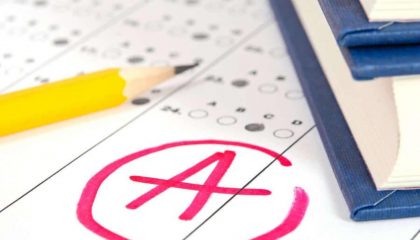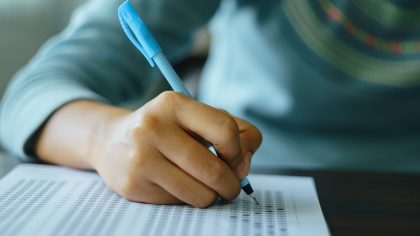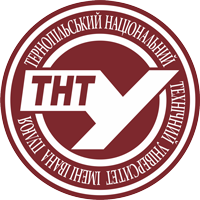Grades
The following grades are used for the courses:
| Points |
Ukrainian grade |
ECTS grade |
Definition |
| 90 – 100 | Excellent/ vidminno | A | Excellent – outstanding performance with only minor errors |
| 82 – 89 | Good/ dobre | B | Very good – above the average standard but with some errors |
| 75 – 81 | Good/ dobre | C | Good – generally good work with a number of notable errors |
| 67 – 74 | Satisfactory/ zadovil’no | D | Satisfactory – fair but with significant shortcomings |
| 60 – 66 | Satisfactory/ zadovil’no | E | Sufficient – passable performance, meeting the minimum criteria |
| 35 – 59 | Poor/Fail/ nezadovil’no | FX | Fail – some more work required before the credit can be awarded |
Pass grades: A, B, C, D, E.
 Fail grades: FX.
Fail grades: FX.
Other: pass, fail.
Faculty members control class attendance and grading. They check attendance and immediately notify the Dean’s Office concerning students on class rolls who have not reported to class.
Exams
At the end of each autumn (AmE fall) and spring semester approximately two weeks are set aside for exam period. Exam period is established as a time to administer end-of-course examinations. Exam period is the period after the last day of classes. The end-of-course examination timetable is published by the Academic Affairs office.
Reading days
The two days before the exam in the autumn (AmE fall) and spring semesters are designated reading days. No classes are held on these days; instead, students are encouraged to use these days for study and review.
Your availability
You should not book any travel during the exam period. We expect you to be available for the entire examination period and to sit your exams at the campus where they are scheduled.
If you are unable to sit an examination at the scheduled time, please immediately contact the Dean’s Office.
Examination timetable
- Examinations will be held in accordance with the published timetable which will be available at least 1 week before the commencement of the examination period and will include the date, time and venue of each examination.
- Examinations are held on seven days a week from Monday to Sunday.
- Students should read the examination timetable carefully to ensure that they have been correctly entered for their examinations and know the time, date and location of the examinations they are required to take.
- Misreading the examination timetable will not be accepted as a satisfactory explanation for absence from an examination.
Examination arrangements
Note: You must sit an examination if it is a part of the course requirement in order to be awarded a grade.
Examination date
- Please check your timetable carefully for your exam time and campus.
- If your timetable does not appear to be correct, please check this with the Dean’s Office immediately.
- Reprints of the timetable may be requested from the Dean’s Office.
Finding your examination room
- Please check that you sit in the correct room for your course and your name.
Latest time of entry/Missed examinations
- Latecomers will not be given any extra time.
- If you miss or are too late for your examination you must contact the Dean’s Office immediately.
Exam Preparation Tips

- Make sure you understand what you have studied. Don’t just try to memorise it. Ask your teacher or groupmates for help if you find something difficult to understand.
- Look again at what you have studied as soon as possible after class. You are more likely to remember information if you look at it again within 24 hours of first hearing it.
- Organise your study time. A revision timetable will help you make the most of your study time.
- Eat something before you study. Food will give your brain the energy it needs to concentrate for long periods of time. Fruit is a good choice – the sugar in fruit will keep you more awake than coffee.
- Drink plenty of water while you study. Not drinking enough water can make you lose concentration and make it harder for you to remember information.
- Choose places to study where you will not be disturbed. Noise and other distractions make it difficult to concentrate and can affect the amount of information you remember.
- Take regular breaks during study time. Taking a 20-minute break every two hours will give you time to remember what you have already learned and also help you concentrate for the next two hours.
- Take practice tests. There is no better way to prepare for a test than to take regular practice tests. Not
only can you learn the language you need to pass the exam, but you can also get to know the style of exam questions and practise good exam techniques. - Join a study group. Studying with friends and groupmates can help motivate you to study more regularly.
- Work out when you study best. Some people work best in the mornings, others at night. Decide when you work at your best and try to study at those times.
General Memory Tips
- Concentrate! You need to learn something before you can remember it. So listen in class and choose quiet places to study, where you can concentrate.
- Ask yourself questions about what you are studying as you read. You are more likely to remember information if you have a purpose for reading it. Ask yourself questions about what you are studying as you read.
- Try to remember your lessons without your books. A very good way to remember information is to try to remember it without your books. Test your memory by making notes and then checking them against your books.
- Quickly look again at what you have studied at the end of every lesson. Quickly look at the main points of what you have studied at the end of each lesson to help you remember them later. Summarise your notes using key words – these key words will help improve your memory later on.
- Look at what you have studied as often as possible. Regular study is a better way of remembering than trying to learn everything at the last minute.
- Use different learning techniques. Generally, we remember 20% of what we read; 30 % of what we hear; 40% of what we see; 50% of what we write or say and 60% of what we do. Write material down, say it out loud, draw pictures: try to use all your senses.
CHEATING IS A SERIOUS OFFENCE AND WILL NOT BE TOLERATED
Please read this information carefully
Exam Taking Tips

- Get at least 6 hours sleep the night before a test. You are more likely to remember what you have learned if you have had a good night’s sleep.
- Eat before a test. Food will give your brain energy and help you to concentrate.
- Wear comfortable clothing. Being uncomfortable is a distraction. Also, it’s better to wear several layers of clothing so you can put on or take off an item if you feel hot or cold.
- Arrive 20 minutes before your exam.
- Make sure you understand all the instructions before you begin.
- Raise your hand to attract the attention of an examiner/invigilator/supervisor if you have a question.
- Raise your hand if you suspect there is a mistake on the exam paper.
- Before you start your test, quickly look at the whole test paper. Looking at the test paper quickly before you start will help you to manage your time better. Decide how long you should spend on each question.
- Always read the questions carefully. One of the most common mistakes students make is not to read the questions carefully enough. Read all instructions slowly and twice if you have time.
- Answer the questions you find easy first. Answering the questions you find easy first will give you confidence and save you time later on.
- Don’t waste time on questions you cannot answer. Spending a lot of time on a question can make you lose confidence. If you can’t answer a question, go to the next one and come back to it later, if you have time.
- Check your answers carefully. If you have time at the end of the exam, read through your answers. But remember, your first answer is usually correct so only change answers if you see a mistake.
- Write legibly in black or blue ink. Where answers are illegible they may be unmarked or partly marked.
- Cross through your rough notes.
- Be positive and try to stay relaxed. If you are relaxed, you will be able to concentrate better. Breathe slowly and deeply and try to put all negative thoughts out of your mind.
- Remain silent in the exam room until all scripts have been collected and you are told to leave the room.
- Do not disturb or annoy others in the exam room by eating, drinking or any other inappropriate behaviour.
- Do not communicate with another student in the exam room, nor copy from another’s answers.
- No books or material in an exam may be shared.
- Hand in your answer sheet, together with any other paper used in the examination. Your name, subject/course number should be written on the front cover of each your answer sheet and should be completed before the end of the examination.
- Do not separate, bend or fold the answer sheet.
- Remain quiet in the building after your exam – there will be other exams still being sat.
Transcripts
A transcript is an official summary of a student’s academic performance and progress to date. A transcript may be needed for verification by prospective employers or by other educational institutions to which you are applying.
Official transcripts are available to both current students and alumni and include the student’s complete academic record at the University. Transcripts are confidential and can only be released by request from a student or alumnus. Applications for transcripts must be made by the student/former student themselves.
Processing
Orders are normally processed within 2 working days, except during peak periods at the start and end of the term.
Same-day pickup
Same-day service is available for in-person requests only at the Dean’s Office.
Same-day pickup orders must be made before 10.00 am, Monday to Friday. Typical processing time is less than one hour, but during peak periods may be longer. This service is subject to availability and is not guaranteed. Please inquire about availability when ordering.
Pickup and delivery information
Transcripts may be picked up from the Dean’s Office.
Final transcript
You may receive one paper copy of your final transcript upon completing your degree. If you are yet to complete your degree, please contact the Dean’s Office for proof of study.
Ordering extra copies of final transcripts
If you are expecting examination results, please wait until you receive your results before requesting extra copies of a final transcript. Requests placed before your results are released may not include your final results.
On-course transcripts
If you haven’t yet completed your course, you can request copies of your on-course transcript. This will show your academic achievement to date but will not include a final classification.
Please note that when you collect transcripts, you will need a Photo ID to ensure we release the documents to the correct person.
Diploma supplement
If you are applying for a course in a European university, most institutions will ask you to supply an academic transcript. However, some institutions may ask you to provide a diploma supplement.
The Diploma Supplement accompanies a higher education diploma, providing a standardised description of the nature, level, context, content and status of the studies completed by its holder. This document consists of the academic transcript, a statement quantifying your course in terms of ECTS credits, plus additional information describing the higher education system.

 Member of European University Association
Member of European University Association